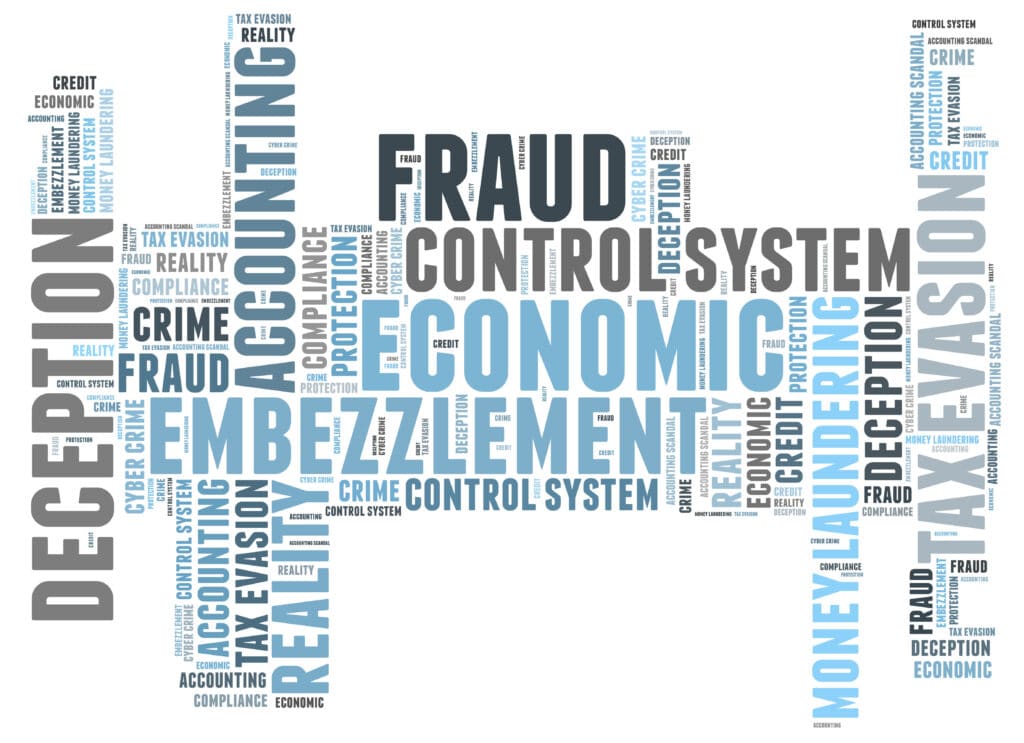Have you or a loved one been charged with federal embezzlement? If so, you need an experienced embezzlement lawyer to mount a vigorous defense. Federal embezzlement charges are serious matters that can result in long federal prison sentences. Learn about what embezzlement is and how we can help here.
Don’t hesitate to contact the Zoukis Consulting Group to discuss your charges with our embezzlement lawyers. Book a free initial consultation today!
Table of contents
- Embezzlement Lawyer | Embezzlement Charges
- What Is Embezzlement?
- Embezzlement Definition
- Types of Embezzlement Charges
- Public Money, Property, or Records (18 U.S.C. § 641)
- Federal Court Employee (18 U.S.C. §§ 645, 646, & 647)
- Custodians Misusing Public Funds (18 U.S.C. §§ 648 & 649)
- Embezzlement by Financial Institution Employees (18 U.S.C. §§ 656 & 657)
- Solicitation or Use of Gifts (18 U.S.C. § 663)
- Programs Receiving Federal Funds (18 U.S.C. § 666)
- Embezzlement in Connection with Healthcare (18 U.S.C. § 669)
- Organizational Defendants (18 U.S.C. § 3571)
- What Should I Look for in an Embezzlement Lawyer
- How Do I Know If an Embezzlement Attorney is Right for Me?
- Fighting Your Embezzlement Charges

Embezzlement Lawyer | Embezzlement Charges
White-collar crimes come in many different shapes and sizes. They are usually related to obtaining money illegally.
Embezzlement is one of the most common white-collar crimes. What is embezzlement, and what do you need to know if you face embezzlement charges? Continue reading to learn more.
What Is Embezzlement?
Embezzlement is the wrongful taking of another person’s or company’s money or property. This is distinct from common theft in that the person has legal access to the property or money but not legal ownership of it. The violation of the special position of trust creates the distinction of embezzlement instead of simple theft.
While both state and federal criminal law prohibit embezzlement, the crime must be against the federal government for it to qualify as a federal embezzlement charge. For example, if a federal government employee abuses their position to steal from their government employer, this would qualify as federal embezzlement. Likewise, if a private party works under a federal government contract (e.g., a federal construction project), and the person steals or overbills, this may qualify as a federal crime.
Embezzlement Definition
The Department of Justice defines embezzlement as “the fraudulent appropriation of property by a person to whom such property has been entrusted, or into whose hands it has lawfully come.”
The Department of Justice explains federal embezzlement as consisting of four elements:
- A trust or fiduciary relationship existed between the person and the government agency.
- The property at issue was obtained because of the employment relationship.
- The person’s dealings with the property constituted appropriation or fraudulent conversion for personal use.
- The person acted with the specific intent of unlawfully depriving the rightful government owner of the property.
In other words, federal embezzlement crimes are when individuals take something they have access to, but that doesn’t belong to them. Namely, money or property that belongs to the federal government.
Types of Embezzlement Charges
There are many types of embezzlement charges. The critical difference between them is what type of property or how much money was stolen. Likewise, the defendant’s role determines the specific federal law violation that occurred. This is significant because penalties differ based on the underlying facts and charged conduct.
Let’s run through some of the more common federal embezzlement examples. These sections also discuss allowable federal embezzlement penalties.
Public Money, Property, or Records (18 U.S.C. § 641)
This includes anyone who steals money, property, or a thing of value that belongs to the federal government. This theft can also be from any federal government contractor.
- Value $1,000 or Less: Up to one year in prison and up to a $100,000 fine.
- Value More than $1,000: Up to ten years in federal prison and up to a $250,000 fine.
Federal Court Employee (18 U.S.C. §§ 645, 646, & 647)
Federal court employees can be charged with embezzlement for two different types of criminal conduct. One, if they directly steal money or property from the court. Two, they fail to deposit funds received as part of their federal employment promptly. In effect, this is employee theft from a federal court.
In the case of direct theft, convicted defendants are subject to the following punishments:
- Value $1,000 or Less: Up to one year in prison and up to a $100,000 fine.
- Value More than $1,000: Up to ten years in prison and a fine of up to $250,000, or double the theft amount, whichever is greater.
The same penalties apply to federal court employees who fail to deposit funds with one exception. For property with a value greater than $1,000, they can only be fined up to the value embezzled or $250,000, not double the value’s amount.
Custodians Misusing Public Funds (18 U.S.C. §§ 648 & 649)
This form of federal embezzlement is similar to the prohibitions discussed above for court employees, except these crimes pertain to any person who embezzles federal government funds.
- $1,000 or Less: Up to one year in federal prison and a fine of up to $100,000.
- More than $1,000: Up to ten years in prison and a fine of up to $250,000, or double the theft amount (whichever is greater).
Embezzlement by Financial Institution Employees (18 U.S.C. §§ 656 & 657)
This federal criminal law violation applies to any Federal Reserve employee or bank employee whose bank operates under the Federal Reserve Act. It also applies to lending, credit, and insurance company employees.
- $1,000 or Less: Up to one year in federal prison and a $100,000 fine.
- More than $1,000: Up to 30 years in federal prison and a fine of up to $1 million.
Solicitation or Use of Gifts (18 U.S.C. § 663)
Any person who solicits property or money on behalf of the federal government while intending to keep it may be charged under this statute. This includes keeping gifts or donations intended for the federal government.
Any federal criminal defendant convicted under this statute is subject to five years in federal prison and a $250,000 fine.
Programs Receiving Federal Funds (18 U.S.C. § 666)
Employees of organizations that have received $10,000 or more in federal funds in the past year may be charged federally for embezzlement. This includes federal funds through loans, grants, contracts, insurance, and other forms of funding.
If the embezzled value exceeds $5,000, the person may be imprisoned for up to ten years and fined up to $250,000.
Embezzlement in Connection with Healthcare (18 U.S.C. § 669)
Anyone who embezzles funds from a healthcare benefits plan may be charged under federal law. The punishment for this offense depends on the value of the embezzled money, property, or other benefits.
- $100 or Less: Up to one year in federal prison and a fine ranging from $5,000 to $100,000.
- More than $100: Up to ten years in jail and a $250,000 fine.
Organizational Defendants (18 U.S.C. § 3571)
Federal prosecutors can also charge organizations defendants under the above federal embezzlement laws. The primary difference between individual defendants and organizational defendants is the allowable sanction. Typically, organizations charged under any form of embezzlement are subject to higher penalties.
For example, if the conduct constitutes a felony, the below guidelines apply:
- A fine in the amount discussed above.
- A fine twice the amount of the gain or loss.
- Up to a $500,000 fine.
If the offense conduct constitutes misdemeanor embezzlement, the organization may be fined up to $200,000.
If your organization is charged with a federal crime, you need an experienced criminal defense attorney on your side. Your lawyer can explain embezzlement’s meaning and help you craft an embezzlement defense.

What Should I Look for in an Embezzlement Lawyer
Due to the severity of the above-discussed federal embezzlement sentences, hiring an experienced federal embezzlement attorney or law firm is crucial. You want counsel who has significant experience defending against these types of federal charges.
The below factors should also be considered when retaining an embezzlement lawyer:
Availability
The immediate availability of the embezzlement attorneys you are considering is essential in your decision. You cannot afford to wait for someone to become available. The right time to retain an embezzlement lawyer is when you become aware of a federal investigation or upon the filing of federal charges for embezzlement.
Experience
The best federal embezzlement lawyers have strong backgrounds in business or finance. This is because they understand the underlying parts of business operations.
You want to hire an attorney who has experience successfully defending embezzlement cases. Avoid lawyers who specialize in other areas of white-collar crime or who primarily practice state criminal defense.
Fees
When hiring an embezzlement attorney, be prepared to pay a high hourly or flat fee. Generally speaking, the more complex the case, the more it will cost to defend against. Likewise, you should hire the most experienced embezzlement attorney you can afford.
How Do I Know If an Embezzlement Attorney is Right for Me?
If you consult with multiple embezzlement lawyers before hiring one, be sure to have a conversation that makes you feel comfortable with the embezzlement defense lawyer you choose. Ask your prospective embezzlement defense lawyer about their experience dealing with similar federal criminal cases and if they have any conflicts of interest that could harm your case.
Important topics to consider during discussions with federal embezzlement attorneys include:
- The charges against you.
- Each charge’s maximum and likely sentence.
- Any complications that they expect to arise during the case.
- The most likely outcome of the criminal litigation against you.
This information will help you decide which attorney to choose. It is essential to feel comfortable with your embezzlement attorney. The fate of your case and future could depend on their skill and expertise.
Fighting Your Embezzlement Charges
Now that you know more about federal embezzlement charges, it’s time to start working on your defense. If you or a family member are under investigation or charged with embezzlement, you need an experienced embezzlement lawyer. The Zoukis Consulting Group has the knowledge and experience necessary to help you through this trying time.
Contact us today for a free consultation.
Published Feb 15, 2022 by Christopher Zoukis, JD, MBA | Last Updated by Christopher Zoukis, JD, MBA on Mar 26, 2023 at 4:12 am


